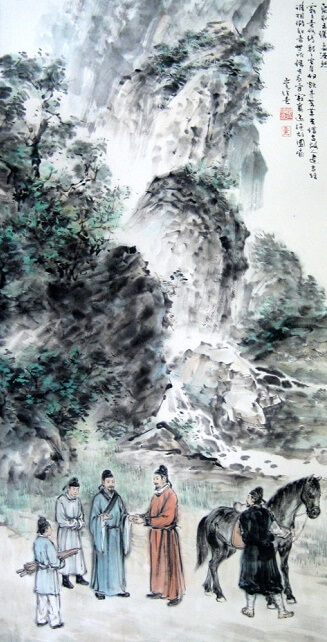Taking Leave of Wang Wei
- Poetry of Meng Haoran
《留别王侍御维 / 留别王维》
- Last updated: 2024-04-27 16:32:20

中文原文
Simplified Chinese Version
寂寂竟何待,朝朝空自归。
欲寻芳草去,惜与故人违。
当路谁相假,知音世所稀。
只应守寂寞,还掩故园扉。
Traditional Chinese Version
寂寂竟何待, 朝朝空自歸。
欲尋芳草去, 惜與故人違。
當路誰相假, 知音世所稀。
祗應守寂寞, 還掩故園扉。
English Translation
Slow and reluctant, I have waited
Day after day, till now I must go.
How sweet the road-side flowers might be
If they did not mean good-bye, old friend.
The Lords of the Realm are harsh to us
And men of affairs are not our kind.
I will turn back home, I will say no more,
I will close the gate of my old garden.
Five-character-regular-verse
· Next:Memories in Early Winter
- Why Chinese poems is so special?
- The most distinctive features of Chinese poetry are: concision- many poems are only four lines, and few are much longer than eight; ambiguity- number, tense and parts of speech are often undetermined, creating particularly rich interpretative possibilities; and structure- most poems follow quite strict formal patterns which have beauty in themselves as well as highlighting meaningful contrasts.
- How to read a Chinese poem?
- Like an English poem, but more so. Everything is there for a reason, so try to find that reason. Think about all the possible connotations, and be aware of the different possibilities of number and tense. Look for contrasts: within lines, between the lines of each couplet and between successive couplets. Above all, don't worry about what the poet meant- find your meaning.
List of Chinese poets
Pre-Qin Poetry
Han poetry
Ban Gu Cao Cao Cao Zhi Liu Bang Ruan Ji Su WuSix Dynasties Poetry
Tao YuanmingTang poetry
Bai Juyi Cen Shen Chen Zi'ang Cui Hao Chang Jian Cui Tu Chen Tao Du Fu Du Mu Du Shenyan Dai Shulun Du Xunhe Du Qiuniang Gao Shi Gu Kuang Han Yu He Zhizhang Han Hong Huangfu Ran Han Wo Jia Dao Jiaoran Jin Changzu Li Bai (Li Po) Li He Li Shangyin Liu Yuxi Liu Zongyuan Luo Binwang Li Qi Liu Changqing Lu Lun Li Shen Li Yu Li Qiao Li Yi Liu Fangping Liu Zhongyong Meng Haoran Meng Jiao Ma Dai Pei Di Qian Qi Quan Deyu Sikong Shu Song Zhiwen Shen Quanqi Xuanzong of Tang Wang Bo Wang Changling Wang Wei Wang Zhihuan Wei Yingwu Wen Tingyun Wang Han Wei Zhuang Wang Wan Xue Tao Xu Hun Yuan Zhen Yu Xuanji Yu Shinan Yuan Jie Zhang Jiuling Zhang Ji Zhang Hu Zhang Zhihe Zu Yong Zhang Xu Zhu Qingyu Zheng Tian Zhang BiSong Poetry
Cai Xiang Chao Chongzhi Fan Chengda Fan Zhongyan Huang Tingjian He Zhu Kou Zhun Jiang Kui Lu You Li Qingzhao Liu Yong Mei Yaochen Ouyang Xiu Pan Lang Qin Guan Qian Weiyan Su Shi Su Zhe Song Qi Wang Anshi Wen Tianxiang Xin Qiji Yang Wanli Yue Fei Yan Jidao Yan Shu Zeng Gong Zhang Xian Zhou Bangyan Zhu Shuzhen Zhu XiYuan poetry
Ma ZhiyuanMing poetry
Tang Xianzu Tang Yin Xu Wei Yu Qian Yang ShenQing poetry
Nalan Xingde Tsangyang Gyatso Pu Songling Cao Xueqin Wang Guowei Zheng Xie